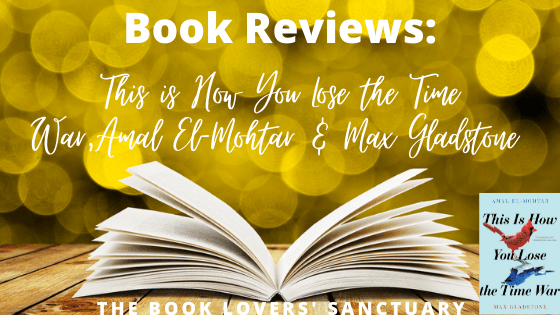
I love you. I love you. I love you. I’ll write it in waves. In skies. In my heart. You’ll never see, but you will know. I’ll be all the poets, I’ll kill them all and take each one’s place in turn, and every time love’s written in all the strands it will be to you.
There are some books that linger towards the upper parts of your tbr list but never quite reach the top and This is How You Lose the Time War has been like that for me. I got it and Gideon the Ninth at the same time and just happened to get to Gideon first before other things (other books, book prize lists, lockdown and covid, teacher assessed grades) got in the way.
And what a book I missed!
The story is quickly summed up. Two rival organisations, the Agency and Garden, manipulate time through the use of elite time travelling agents who travel up- and downthreads of time. Two of these agents, the cybernetically enhanced Red for the Agency and the organically enhanced Blue for Garden, start a correspondence. Initially the letters indicate a certain professional respect and taunting but they grow into friendship and then an all-consuming love.
Each chapter comprises a vignette of the time war – sometimes futuristic, sometimes historical – before a letter is discovered and read. But it would, of course, be too mundane for these letters to be written on paper. Instead, impossibly, they are written in fire, in water boiling in an MRI machine, in the circles of a sawn down tree, in seeds, in the viscera of animals.
It is not an easy novel to review: the war itself is mere backdrop. This is no exploration about the conflict between industrialisation and nature, although both characters mock each others’ world view. Nor is it a diatribe against war itself – although the authors don’t shy away from a little brutality, as the novel opens with Red alone amongst a multitude of corpses as she
holds a corpse that was once a man, her hands gloved in its guts, her fingers clutching its alloy spine. She lets go, and the exoskeleton clatters against rock. Crude technology. Ancient. Bronze to depleted uranium. He never had a chance. That is the point of Red.
The strength of the book – it’s beauty – is in the language, certainly the language in each of the letters but also the language in the third person narrative. The language is muscular and sensory and physical – there is much about hunger and eating here (“superb honey: best eaten in a thickness of comb, spread on warm bread with soft cheese, in a cool part of the day.”); yet it is also personal, emotional and yearning. As Blue writes letters in seeds – sumac, capable of being both spice and poison which is a delicious metaphor perhaps for love – that Red has to crack under her teeth to read and savour, she writes that
I feel you, the needle of you, dancing up and downthread with breathtaking abandon. I feel your hand in places I’ve touched…. and the sharp, electric ache to stop you just to see you admire me is a kind of needle too.
And in a letter contained in a bee’s dance, its postscript in its sting, she writes that
this thing in me, this piping heat, this rising sun that hardly fits in the sky of me won’t stay put. To know you my equal in this, too—this beat of my blood’s drum, this feast that won’t diminish no matter how I ravage it—Red.
It is also an unusually literary and allusive book – though perhaps that reveals my prejudices about the genre and the limitations of my reading in it. We stumble across Naomi Mitchison (“the same in all strands in which it exists”) and Romeo and Juliet which veers between tragedy and comedy in different strands and “It delights [Blue], whenever visiting a new strand, to take in a performance not knowing how it will end.” Poets and philosophers are cited and quoted throughout: “Look on my works, ye mighty and despair”!
About two thirds of the way through, the novel starts to reach a crisis and the highly structured format (which was on the verge of becoming repetitive) changes and the war itself becomes more pressing and a more direct threat. And that change from the lyrical to a more plot-driven genre does not detract from – and perhaps it intensifies – the personal nature of these two protagonists. And it certainly pulls on the heart strings of the reader!
In conclusion, this was a gem of a book and I perhaps am best to leave you with another reader’s review which sums it up much more succinctly than I!

Overall:
Characters:
Plot / Pace:
Worldbuilding:
Structure:
Language:
Page Count: 208
Publisher: Jo Fletcher Books
Date: 18th July 2019
Available: Amazon, Jo Fletcher Books




[…] This Is How You Lose The Time War, Amal El-Mohtar and Max Gladstone […]
LikeLike
[…] and/or Blue, This is How You Lose the Time War by Amal El-Mohtar and Max […]
LikeLike
[…] This is How You Lose The Time War, Amal El-Mohtar and Max Gladstone […]
LikeLike
[…] This Is How You Lose The Time War […]
LikeLike
[…] This is How You Lose The Time War, Amal El-Mohtar and Max Gladstone […]
LikeLike
[…] This is How You Lose the Time War, Amal El-Mohtar and Max Gladstone […]
LikeLike
[…] Science Fiction is not a genre I dip into often, but I generally do enjoy it when I do! There are quirky, heartwarming writers like Becky Chambers or the glorious weirdness that is Tamsyn Muir’s Locked Tomb and even the lyricism of This Is How You Lose the Time War… […]
LikeLike
[…] Red and Blue, This is How You Lose the Time War […]
LikeLike